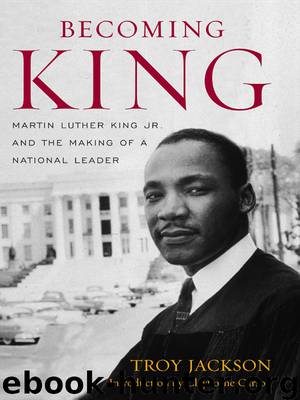Becoming King by Troy Jackson

Author:Troy Jackson [Jackson, Troy]
Language: eng
Format: epub
ISBN: 978-0-813-17317-7
Publisher: The University Press of Kentucky
Published: 2008-03-24T16:00:00+00:00
With any growing organization emerging quickly in response to a specific challenge, infrastructure often lags. A lack of clear organization policies and guidelines did allow for MIA monies to be claimed by individuals within the movement, including King. Without clear guidelines or accounting, it is also possible that greed prevailed on more than one occasion, as leaders helped themselves to more of the funds than was warranted. Fields’s allegations of financial mismanagement were thus not without merit.52
Fields experienced significant backlash for going to the white press with his claims. Johnnie Carr, who attended Hall Street Baptist Church, where Fields had served prior to Bell Street, later remembered the young minister’s greed as one of the things that led him to be dismissed from the church. According to Carr, Fields publicly denigrated Hall Street Baptist’s treatment of him. Far more egregious in Carr’s eyes was Fields’s betrayal of the organization in response to a personal offense: “I think very little of anybody who was part of the inside who would go out and try and destroy.” B. J. Simms, who headed the transportation committee for the MIA, believed Fields wanted to lead the boycott, and when that did not happen he allowed jealousy to cloud his judgment. Simms asserted, “Fields decided if he couldn’t run it, he’d ruin it.” This torrent of criticism led Fields to later claim that he “found there’s no pressure like pressure from the inside group.” Nixon wondered if some of the trouble was not attributable to Fields’s willingness to challenge some of King’s decisions. In the end, this perceived insubordination led to his dismissal from the executive board, and after his public allegations, “some of King’s supporters run that man off.”53
The MIA used the funds that came into their coffers to keep the car pools going, to pay for legal expenses, and to maintain communication through efforts like the MIA newsletter. According to Erna Dungee Allen, some of the organization’s finances also went toward helping people with financial needs in the community. The organization assisted residents with rent, paid energy bills, provided food for those who needed it, and even purchased a few washing machines for families. She believed the MIA engaged in these types of assistance to try “to get along with the people. And usually the folks who weren’t participating, who didn’t belong to a church or anything, were the ones who came for help. They were usually the poorest ones.” Allen remembered King as particularly concerned with the plight of Montgomery’s poorest. While he didn’t support all the charitable assistance, “he felt like he had to go along with most of it.”54
Throughout the summer, some whites continued to resort to desperate strategies in an attempt to discourage, intimidate, and hamper those participating in the boycott. As ripples of civil rights struggles spread from Tuscaloosa to Birmingham to Montgomery, it was easier for whites in the state to blame outsiders for the challenges rather than attribute the protest to indigenous dissatisfaction with the racial status quo.
Download
This site does not store any files on its server. We only index and link to content provided by other sites. Please contact the content providers to delete copyright contents if any and email us, we'll remove relevant links or contents immediately.
| African Americans | Civil War |
| Colonial Period | Immigrants |
| Revolution & Founding | State & Local |
Cat's cradle by Kurt Vonnegut(13900)
Pimp by Iceberg Slim(12949)
Underground: A Human History of the Worlds Beneath Our Feet by Will Hunt(11266)
4 3 2 1: A Novel by Paul Auster(11078)
The Radium Girls by Kate Moore(10921)
American History Stories, Volume III (Yesterday's Classics) by Pratt Mara L(4829)
Perfect Rhythm by Jae(4629)
Wiseguy by Nicholas Pileggi(4602)
The Fire Next Time by James Baldwin(4352)
Paper Towns by Green John(4178)
A Higher Loyalty: Truth, Lies, and Leadership by James Comey(4042)
Pale Blue Dot by Carl Sagan(4018)
The Mayflower and the Pilgrims' New World by Nathaniel Philbrick(3921)
The Doomsday Machine by Daniel Ellsberg(3741)
Too Much and Not the Mood by Durga Chew-Bose(3701)
Killers of the Flower Moon: The Osage Murders and the Birth of the FBI by David Grann(3626)
The Borden Murders by Sarah Miller(3597)
The Sympathizer by Viet Thanh Nguyen(3522)
Killing England by Bill O'Reilly(3465)
